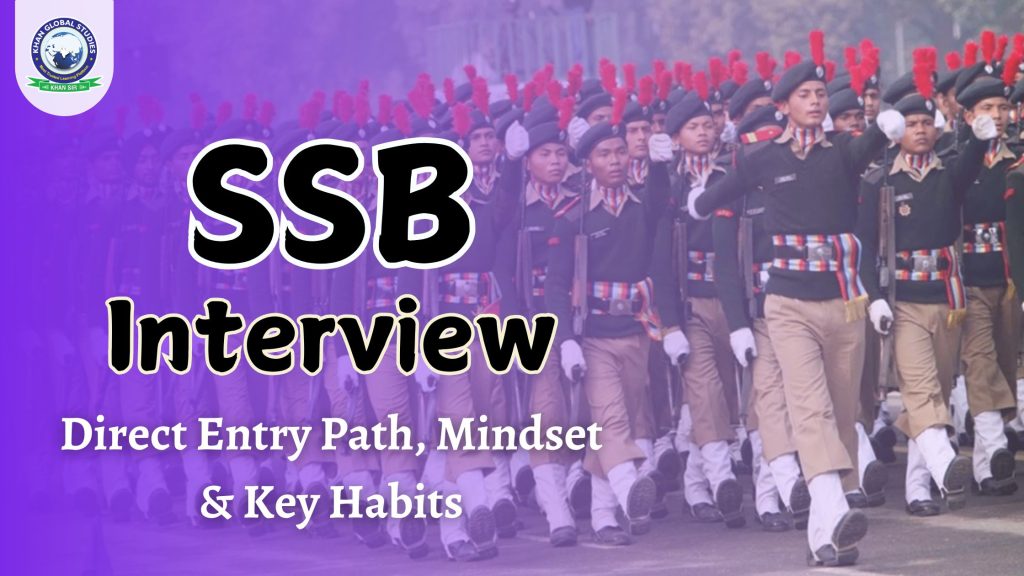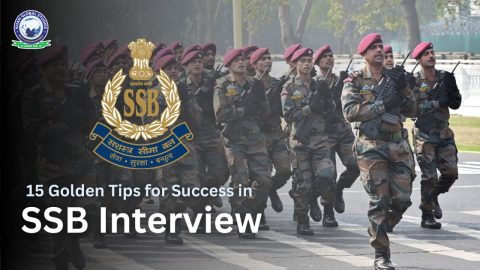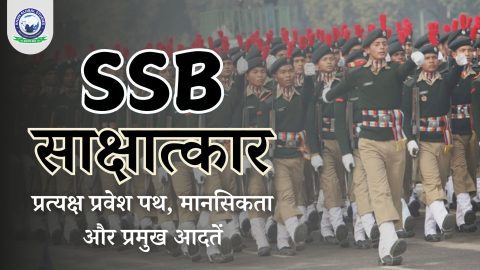The Service Selection Board (SSB) interview is one of the most challenging stages for individuals aspiring to join the Indian Armed Forces. Direct entry into the SSB interview process comes with various benefits and challenges. This article will provide detailed information about the SSB interview, the concept of direct entry, and the important habits and thought processes required to excel in SSB.
What is a direct entry in an SSB interview?
In the SSB interview, there are two main routes: through written exams like NDA, CDS or by direct entry. Direct entry is usually reserved for candidates who meet certain qualifications or belong to special recruitment programs. Some examples of direct entry include:
- Technical Graduate Course (TGC): For engineering graduates.
- University Entry Scheme (UES): For final-year engineering students.
- NCC Special Entry: This is for candidates holding a ‘C’ certificate from NCC.
- AFCAT (Air Force Common Admission Test): AFCAT allows candidates to enter directly for the SSB interview for the Air Force.
Direct entry means you skip the preliminary written exam stage and go straight to the interview. However, this doesn’t make the selection process any easier, as the SSB interview requires a mix of mental acuity, physical fitness and the right mindset.
Main Stages of the SSB Interview Process
The SSB interview is designed to assess the suitability of the candidate for a career in the Indian Armed Forces through various tests. The process lasts for five days and involves various assessments. Here is a description of the main stages:
1. Screening Test (Day 1)
The first day consists of an intelligence test and a Picture Perception and Description Test (PPDT). The intelligence test measures verbal and non-verbal reasoning skills, while the PPDT assesses your ability to interpret and narrate a story based on a given picture.
2. Psychological Test (Day 2)
The psychological test focuses on measuring your mental flexibility, leadership qualities and thought process. The psychological tests include:
- Thematic Apprehension Test (TAT): You are shown ambiguous pictures and you have to write a story around them.
- Word Association Test (WAT): Words are displayed, and you need to quickly create a sentence.
- Situation Reaction Test (SRT): You must react to different situational challenges.
- Self-Description Test (SDT): Write about yourself from different perspectives (e.g., family, friend, teacher).
3. Group Test (Day 3 and 4)
The group test includes physical tasks, group discussions, and leaderless tasks. These activities help assess your cooperation, team spirit, decision-making ability, and leadership qualities. The key elements include:
- Group Discussion (GD): You must engage in discussions on current affairs or abstract topics.
- Group Planning Exercise (GPE): A test that evaluates your problem-solving and planning abilities in a group.
- Progressive Group Task (PGT): A physical task in which your team has to overcome obstacles using props.
- Individual Obstacles (IO): You complete a series of obstacles individually to test your physical fitness and determination.
4. Interview (Day 4)
The personal interview assesses your communication skills, personality, leadership qualities, and knowledge about current affairs, as well as your motivation to join the armed forces. The interview is conducted by a senior officer, and questions can range from personal background to technical knowledge (especially in direct entry cases like TGC).
5. Conference (Day 5)
The final stage is the conference, where the board of assessors discusses your performance in all the tests. This is a crucial stage, as the final recommendation is made based on your overall impression. If you have performed well, you will be recommended for further medical tests.
Developing the Right Habits for Success in SSB
While knowledge, intelligence, and physical fitness are important, certain habits will substantially increase your chances of success in the SSB interview process. These habits help develop the mindset that the Services Selection Board looks for in future officers.
1. Mental Discipline and Consistency
To succeed in the SSB interview, you need mental discipline. This means regular preparation, both mentally and physically. Develop habits like:
- Reading the newspaper daily to stay updated with current affairs.
- Doing reasoning and problem-solving exercises regularly.
- Maintaining physical fitness through exercise.
- Disciplined routines help you stay consistent and adapt to the rigorous SSB schedule.
2. Positive thought Process
A positive thought process is important. The SSB interview is as much about knowledge and fitness as it is about mental flexibility. Here are some tips:
- Confidence: Believe in your abilities, whether in overcoming obstacles or answering tough interview questions.
- Optimism: Approach every task with a “can do” attitude, even when faced with challenges.
- Composure: Remain calm under pressure, especially during group discussions or when dealing with unexpected questions during an interview.
3. Communication Skills
Effective communication skills are essential, especially during group discussions and interviews. Work on these:
- Clarity of Thoughts: Practice speaking on a variety of topics with accuracy and conciseness.
- Active Listening: Listening to others in group tasks helps you understand different viewpoints and offer solutions accordingly.
- Body Language: Keep your posture confident and maintain eye contact while speaking, as this shows authority and confidence.
4. Leadership and Teamwork
The SSB is designed to test your ability to lead and work as part of a team. Strong leadership is essential, but your ability to collaborate with others is equally important. Foster these qualities:
- Taking initiative: In group activities, lead without being overbearing.
- Motivating others: Encourage your peers and work collectively towards solving tasks.
- Adapting to roles: Whether leading or following, maintain a positive attitude and contribute meaningfully.
Importance of Thought Process in SSB
Your thought process is perhaps the most important aspect of SSB. It reflects how you perceive situations, react under pressure and make decisions. The board is looking for individuals who:
- Can think logically and critically in challenging circumstances.
- Respond calmly when faced with high-pressure situations.
- Analyze situations from multiple perspectives to make the right decisions.
To sharpen your thought process, engage in activities such as meditation and problem-solving exercises to enhance your clarity and focus.
Conclusion
Preparing for SSB interviews, especially through direct entry, requires not only academic and physical preparation but also developing the right habits and a strong thought process. With mental discipline, clear communication, and a positive mindset, you can excel in various tests and emerge as a strong candidate for a career in the Indian Armed Forces.
Also Read:
- Indian Air Force Day 2024: Introduction and History
- Know About NCERT: Syllabus, Books and Importance





